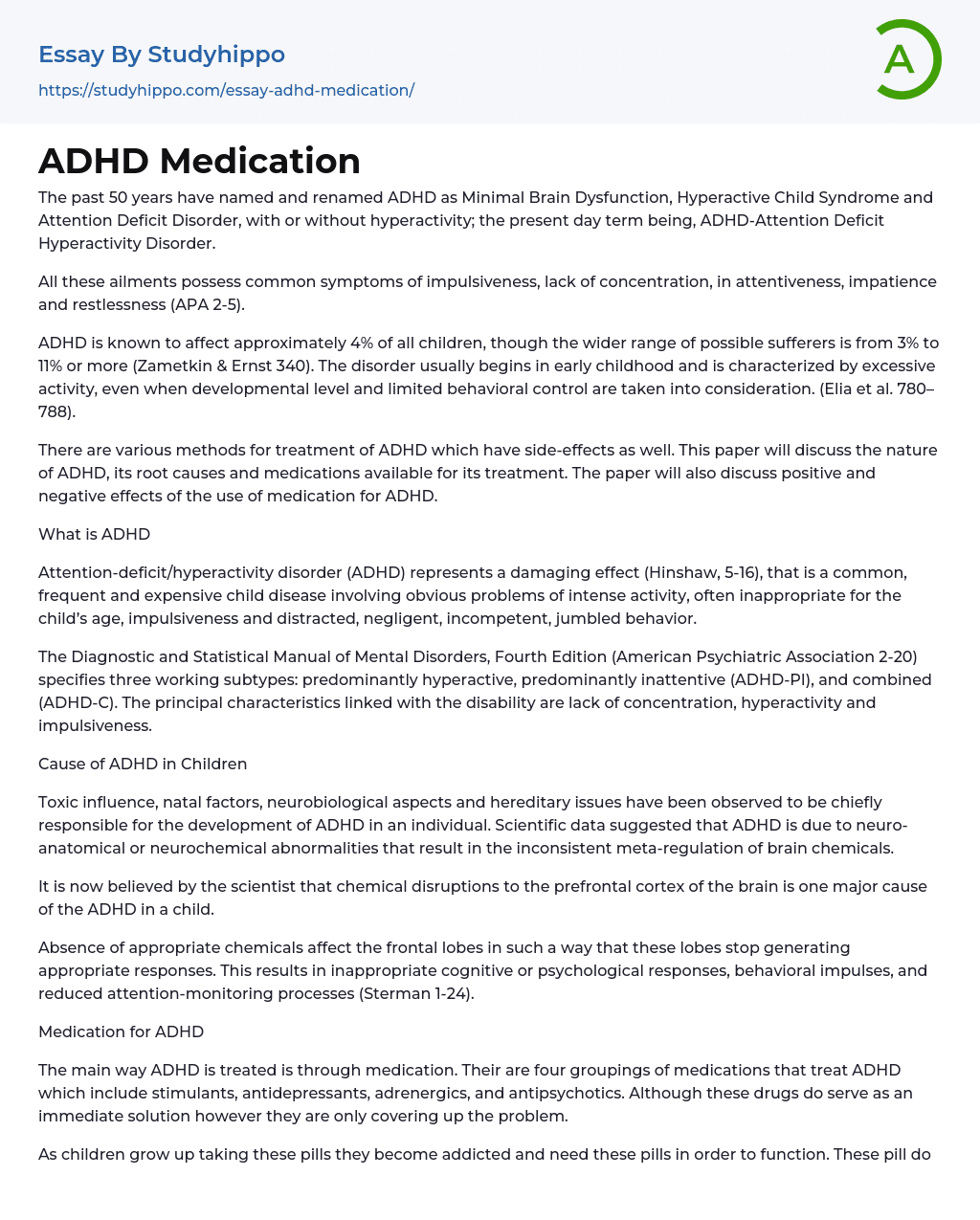ADHD (Attention Deficit Hyperactivity Disorder) has had various names in the past five decades, such as Minimal Brain Dysfunction, Hyperactive Child Syndrome, and Attention Deficit Disorder (with or without hyperactivity).
According to the American Psychological Association (APA, 2-5), these disorders share common symptoms including impulsiveness, lack of concentration, inattentiveness, impatience, and restlessness.
Around 4% of children, with a potential range of 3% to 11% or higher, are impacted by ADHD (Zametkin & Ernst 340). This condition usually begins in early childhood and is characterized by excessive activity that is suitable for the child's developmental stage but with restricted behavioral control (Elia et al. 780–788).
This paper aims to analyze the different methods of treating ADHD and their associated side effects. It will cover various aspects such as the nature of ADHD, its root causes, the medications available, and both the positive and n
...egative impacts of using medication for treating ADHD.
What is ADHD
Hinshaw (5-16) states that ADHD is a common and expensive disorder in childhood with detrimental effects. It is marked by excessive and occasionally inappropriate levels of activity, impulsivity, and disorganized behavior in children.
The Diagnostic and Statistical Manual of Mental Disorders, Fourth Edition (American Psychiatric Association 2-20) categorizes attention deficit hyperactivity disorder (ADHD) into three subtypes: predominantly hyperactive, predominantly inattentive (ADHD-PI), and combined (ADHD-C). The primary symptoms linked to the disorder include lack of focus, hyperactivity, and impulsiveness.
Cause of ADHD in Children
ADHD in individuals is primarily caused by toxic influence, natal factors, neurobiological aspects, and hereditary issues. Scientific evidence reveals that abnormalities in the neuro-anatomy or neurochemistry o
the brain result in inconsistent regulation of brain chemicals.
Scientists now believe that chemical disruptions to a child's prefrontal cortex are a major cause of ADHD.
The lack of proper chemicals has an impact on the frontal lobes, causing them to cease producing correct reactions. Consequently, this leads to inadequate cognitive or psychological responses, behavioral impulses, and diminished attention-monitoring processes (Sterman 1-24).
Medication for ADHD
The main way to treat ADHD is through medication, which falls into four categories: stimulants, antidepressants, adrenergics, and antipsychotics. Although these drugs offer a fast solution, they only conceal the problem.
Children who are raised using these pills develop a dependence on them and rely on them for normal functioning. While the pills effectively manage hyperactive episodes, they also come with numerous adverse effects. Lately, parents have been exploring alternative treatments for this condition including dietary adjustments, behavioral therapies, and safe natural remedies.
Stimulants like Ritalin, Adderall, Dexedrine, and Cylert are frequently used to treat ADHD in kids. They aid in improving focus and managing symptoms of depression and anxiety. Research has demonstrated that these commonly prescribed stimulants effectively enhance behavioral episodes (Pamela Z09).
Both short-term benefits and drawbacks are associated with stimulants. These include loss of appetite, resulting in significant weight loss in children, as well as sleep problems like insomnia that make it particularly difficult for the child to sleep.
Ritalin has adverse effects including physical discomfort, emotional distress, and unexplained irritability. It can also result in severe consequences such as hallucinations, stunted growth, and elevated heart rate and blood pressure levels. A report from the Wall Street Journal
reveals a threefold rise in the utilization of Ritalin over the past ten years. The study examined the usage of both Ritalin and Adderall.
Both drugs had similar side effects, but Adderal had longer-lasting effects. According to Tara D1, the usage of Ritalin has been associated with future depression.
- Cloning essays
- Medical Ethics essays
- Patient essays
- Therapy essays
- drugs essays
- Cannabis essays
- Aspirin essays
- Cardiology essays
- Hemoglobin essays
- Pharmacology essays
- Surgery essays
- alternative medicine essays
- Plastic Surgery essays
- Organ Donation essays
- Vaccines essays
- Medical essays
- Dentist essays
- Psychological Trauma essays
- Physical therapy essays
- Cold essays
- Cocaine essays
- Why Marijuana Should Be Legalized essays
- Drug Abuse essays
- Teenage Drug Abuse essays
- Heart Disease essays
- Artery essays
- Insanity essays
- Adhd essays
- Antisocial Personality Disorder essays
- Anxiety essays
- Bipolar Disorder essays
- Depression essays
- Depression And Anxiety essays
- Dyslexia essays
- Learning Disability essays
- Major Depressive Disorder essays
- Mental Disorder essays
- Mental Illness essays
- Psychosis essays
- Schizophrenia essays
- Stress essays
- Suicide essays
- Addiction essays
- Anatomy and Physiology essays
- Biodegradation essays
- Cancer essays
- Dental Care essays
- Disability essays
- Disease essays
- Disorders essays




